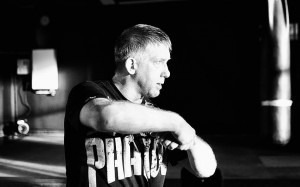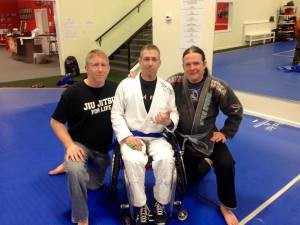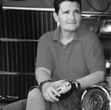Guest Post: Roy Marsh – The Art of Empathy
Our guest post today is written by Royce Gracie Black Belt Roy Marsh
 Roy is one of the very few Tested Black Belts in the World under Royce Gracie and is the Head Instructor and Owner of Team-ROC Southern Pines. Roy is recognized, and sought after, for his technical knowledge and engaging instruction.
Roy is one of the very few Tested Black Belts in the World under Royce Gracie and is the Head Instructor and Owner of Team-ROC Southern Pines. Roy is recognized, and sought after, for his technical knowledge and engaging instruction.
He is a No-Gi World Champion, Multiple No-Gi Pan American and NY Open Gold Medalist, and is a CagesideMMA sponsored athlete. He is also an Advisor to the 82nd Airborne Combatives and Advanced Tactics Program at Fort Bragg, NC, and is MACP (Modern Army Combatives Program) Level II Certified.
You can find out more about Roy at www.roymarshjiujitsu.com
The Art of Empathy
I think one of the best lessons that Jiu-Jitsu teaches us is the lesson of empathy. People may argue with me but I think we don’t look at the world enough through the eyes of others – and, sometimes we’re explicitly told that to do so is weak. But, I believe it’s the opposite. Even without the advantages of the increase in general humanity through understanding the struggles, hardships, advantages, etc. of others, this new worldview can often increase our own abilities.
“Travel is fatal to prejudice, bigotry, and narrow-mindedness, and many of our people need it sorely on these accounts. Broad, wholesome, charitable views of men and things cannot be acquired by vegetating in one little corner of the earth all one’s lifetime.” – Mark Twain
This could be one of the best quotes about Jiu-Jitsu that I’ve ever seen. And, here is the important thing: I am not talking about physical travel (though that is obviously wonderful). I mean, mental and experiential travel. When you train Jiu-Jitsu, you are experiencing new things all the time – you are often getting to feel what others go through. If you are the bully who comes to class, you are in the position of having some little kid control you, beat you, invalidate your physical gifts. If you are the meek, shy person you eventually get this super power – you can defend yourself against bigger, stronger, more aggressive people. The two people are able to experience what the other person has felt. Often, this is a positive experience. The bully (or, maybe just someone physically superior) understands what it’s like to have no power, to be under the control of someone else. Eventually, through this forced empathy, most begin to understand and have sympathy for those who are weaker (not just physically, but often of circumstance). The weak student learns that with commitment, they can take control of their surroundings. They can be confident and assert themselves. They are not as weak as they think.
This empathy with being powerful gives them insight into how someone aggressive or strong may be tempted to abuse that power (and, sometimes, unfortunately, they become a bully themselves). Both students also learn that not always being the winner isn’t the end of the world – that the ability to survive is sometimes all we can accomplish and that is enough. In fact, that is the essence of Helio’s Jiu-Jitsu. I think this is why most Jiu-Jitsu people are some of the most caring people you will ever meet and their schools reflect that. But some do get drawn into the dominating bully mode and view Jiu-Jitsu as a tool to abuse others. Thankfully, this second group is pretty rare.
“Sometimes you don’t have to win. You cannot win. But, that has nothing to do with losing.” – Rickson Gracie
When I was a blue and purple belt and uninjured, I didn’t have a whole lot of empathy for others’ restrictions. I was flexible and aggressive. I thought if people didn’t have certain attributes, that it was because they weren’t working hard enough. I didn’t understand that some people will never be able to reach a certain physical level, either through lack of physical gift, ability to train enough or injury. These weren’t necessarily conscious beliefs but they were certainly hiding in there. And, then I tore my meniscus. I had surgery and after surgery I rolled with an idiot who twisted my knee and set me back even further. To this day, my left knee isn’t great. My two biggest assets were gone (my left hook butterfly sweep and my left leg knee cut pass). To say these were the core of my game and my super weapon is to wildly understate things. And, they were gone. I was depressed and felt like I was starting from scratch.
I had to begin to create a new game, not out of curiosity but out of need. I also began to develop sympathy for people who would say “I just can’t do that.” I began to understand the difference between someone who was lazy versus someone who just cannot. It began to really open my eyes to being able to adjust instruction, depending on a student’s physical abilities. Instead of trying to force him to fit Jiu-Jitsu, I was understanding that Jiu-Jitsu is perfectly capable of fitting him. I also began to understand that the essential Jiu-Jitsu curriculum I teach must be moves that anyone can do, not just the super strong or super flexible (this has had the added benefit of expanding the range of people in my classes). This was again the brilliance of Helio’s innovations. It is why although the rubber guard is fun, it should never be the core of an art. It requires abilities that many people will never have. This is one reason as an instructor I have tried very hard to try to make a student the best version of himself, not of me. I don’t try to make Jiu-Jitsu clones of myself. I want to see what style fits him and do my best to lead him or push him there. And, this requires my ability to empathize with that student.
 I have a student, Brian Freeman, who is paralyzed from the waist down. It’s been a real joy getting to know Brian and it’s been a huge benefit to me as an instructor. When he started with me, we just did private lessons focused on self defense. It was a fun challenge for me to figure out how to modify certain moves so that he could apply them from his wheelchair. It helped me understand what the core of certain moves was and what the parts that could be changed were. Later, Brian joined the regular class and began a lot more of the grappling portion. For a while, I fell into a bad habit. I was trying to modify moves to fit him yes, but I was still trying to force him to fight in my style. I was trying to figure out guards that would work for him, sweeps that would get him on top, ways to maintain dominant position.
I have a student, Brian Freeman, who is paralyzed from the waist down. It’s been a real joy getting to know Brian and it’s been a huge benefit to me as an instructor. When he started with me, we just did private lessons focused on self defense. It was a fun challenge for me to figure out how to modify certain moves so that he could apply them from his wheelchair. It helped me understand what the core of certain moves was and what the parts that could be changed were. Later, Brian joined the regular class and began a lot more of the grappling portion. For a while, I fell into a bad habit. I was trying to modify moves to fit him yes, but I was still trying to force him to fight in my style. I was trying to figure out guards that would work for him, sweeps that would get him on top, ways to maintain dominant position.
I was doing all this with only theoretical understanding of what he was going through. I would get a little annoyed when he would stay on bottom and try to submit from inferior positions (an idea I generally hate is giving up a dominant position for a potential submission or trying to submit from a bad position). But, I didn’t really understand that most of the time, he just could NOT get to a good position. It wasn’t a realistic option for him. I didn’t empathetically understand what he was going through. Ironically, I had been practicing and teaching survival from bad positions and he had gotten good at that, but for most of my students the next step after survival was to progress to a dominant position. For Brian, this wasn’t a very realistic option.
Yes, he was getting good at turning over for single legs but he would never be able to recompose a very effective guard or have any lower body sweeps. So, rather than just lay there defending and trying to occasionally get sweeps I understood he was trying to figure out how to finish the fight with his restrictions. I had to put aside my view of Jiu-Jitsu and look at the world through his Jiu-Jitsu. I began to roll with Brian without using my legs. I began to roll with other students without using my legs. I took away my strongest shields and my best generators of movement. I began to understand the importance of the weaker shields (hands and arms) and how to make those the core of my defense.
I worked to overcome my bias of submitting from a weak position and to explore how to do it. Rolling with Brian is tough with the added advantage of my legs but when I tried to put myself in his world, I understood the huge strides he had made and the definite advantage he had when we were on even term simply because he had more experience in that world than I did. It helped me understand how to better help him and it really helped me become better at Jiu-Jitsu. I try to do this a lot now. I roll with my eyes closed, I roll with only using one hand, I roll as if I have very little strength. I roll without using my legs. I try to empathize with all of these types of “weaknesses” and to see what it teaches me. In a real fight, I try to exploit your disadvantages but I have to experience those truly to be able to do so effectively.
But, in real life, experiencing others’ disadvantages takes away any desire for me to exploit them. This has helped me to see what people are able to accomplish with these disadvantages (not just physical ones). I see the battles that people fight better and see progress they’ve made that I may have never noticed before because it wasn’t progress by my definition. Jiu-Jitsu is about connection and empathy is our strongest method of connection. That should tell us that empathy is a not a weakness but a strength.
Roy Marsh
Tweet



